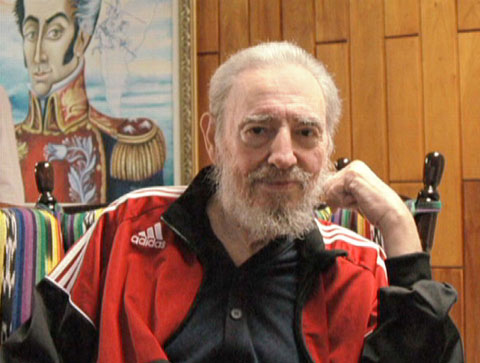
|
|
Cuban leader Fidel Castro poses in this file photo taken by Brazilian President Luiz Inacio Lula da Silva during their meeting in Havana January 15, 2008. Cuban leader Fidel Castro said on February 19, 2008 that he will not return to lead the country. [Agencies]
|
HAVANA - Fidel Castro, who built a communist state on the doorstep of the United States from a guerrilla uprising and defied attempts to oust him by 10 US presidents, retired on Tuesday after almost half a century at Cuba's helm.
The bearded revolutionary, whose cigar-smoking guerrillas ousted US-backed dictator Fulgencio Batista in 1959, has not appeared in public for 19 months since emergency intestinal surgery forced him to hand over power to brother Raul Castro on July 31, 2006.
Castro, 81, has kept himself in the minds of Cubans, however, through a prolific flow of sick bed articles that ranged from denunciations of the US war in Iraq to claiming that U.S. capitalism threatens the survival of humanity.
He said on Tuesday he would not return to lead his country, closing one chapter of the 20th century.
Castro is admired in many Third World nations for standing up to the United States and providing free education and health care.
The Jesuit-educated lawyer and charismatic orator sought to transform Cuba into an egalitarian society and achieved health and literacy levels on a par with industrialized nations.
But critics, led by the United States and the hundreds of thousands of Cubans who left to live abroad, criticized him and maintained that his rejection of free enterprise ruined the economy.
Castro survived a CIA-backed invasion at the Bay of Pigs, assassination attempts, Washington's longest trade embargo and the collapse of the Soviet Union.
"I'm really happy to reach 80. I never expected it, not least having a neighbor -- the greatest power in the world -- trying to kill me every day," he said on July 21, 2006 at a summit of South American presidents in Argentina, where crowds greeted him like a rock star.
Anti-globalization youths the world over saw him as a hero along with revolutionary icon Ernesto "Che" Guevara, his Argentine-born comrade-in-arms.
Castro caught the imagination of the left by pitting his small country against the United States and declaring Cuba a Marxist state even before the Berlin Wall was erected.
His brazen risk-taking took the world to the brink of nuclear war in 1962 when he allowed Moscow to place ballistic missiles in Cuba, leading to a 13-day stand-off between US President John F. Kennedy and Soviet premier Nikita Khrushchev in one of the most dangerous episodes of the Cold War.
Castro supported guerrilla groups in Latin America and sent more than 350,000 Cubans troops to fight in Angola, where they defeated South African forces, leading to the independence of Namibia and hastening the end of apartheid.
Post-Soviet Crisis
But the loss of billions of dollars in subsidies from Moscow after the Soviet collapse plunged Cuba into severe economic crisis in the early 1990s.
The crisis forced Castro to grudgingly open up Cuba to foreign investment and tourism, and legalize the currency of his enemy, the US dollar.
Castro won friends by sending 30,000 Cuban doctors abroad to treat the poor, mainly in Venezuela, but also as far afield as Pakistan, Indonesia and East Timor, while training thousands of doctors from developing counties in Cuba free of charge.
Cuba won annual votes condemning the US embargo at the United Nations backed by all but a handful of US allies.
Castro, who gave up smoking cigars in 1985, stamped his image on history by thumping the lectern during lengthy tirades against imperialism and capitalism or striding at the head of mass marches in his trademark military fatigues.
Cubans call him simply "Fidel." Seventy-percent of them were born after 1959 and have known no other leader. Until he fell ill, Castro was omnipresent in their lives through hours-long speeches and nonstop public activity, but he has not allowed statues of himself or streets named after him.
His pace slowed after fracturing a knee in a serious tumble after a speech in October 2004 seen live on television.
In 2006, the health of the man who said he had survived 638 assassination plots caved in. He underwent life-threatening operations to stop intestinal bleeding and infection. Pictures showed the once robust leader had lost weight and become gaunt and shuffling.
Castro was born on August 13, 1926, in Biran in eastern Cuba, the son of a Spanish immigrant who became a landowner. His family's farm was the first land Castro ordered confiscated by the state after his revolution.
"History will absolve me," Castro declared during his trial for a near-suicidal assault on July 26, 1953 on the Moncada barracks in the eastern city of Santiago, which launched his revolutionary movement.
In December 1956, he returned from exile in Mexico on a overcrowded yacht called the "Granma" and landed with 81 followers in eastern Cuba. They were ambushed and only 12 made it to the rugged Sierra Maestra mountains with seven rifles.
They grew into a guerrilla force of several thousand that swept down from the hills in 1958 to drive the dictator Batista from Cuba on New Year's Day 1959.
